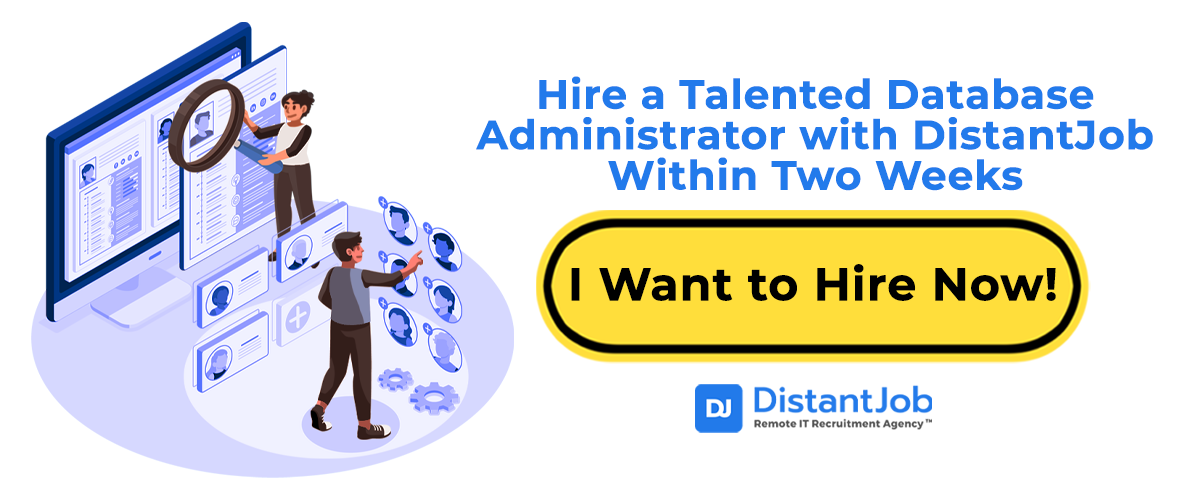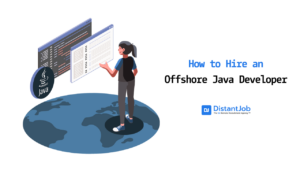Want those insightful interview questions to evaluate candidates and find the right database administrator (DBA) to join your team?
When interviewing candidates for the DBA position, it is essential to consider the responsibility they will hold, as they will have access to your company’s sensitive data. Apart from their technical expertise, they should be adaptable to your company’s culture, capable of performing under high-pressure situations, and take ownership of their work, among other qualities.
To assist you in finding the perfect fit for the role of database administrator, I have compiled a comprehensive list of 25 interview questions. These questions are divided into five main segments, designed to help you gauge the candidate’s suitability for the position. By asking these targeted questions, you can assess both their technical skills and their compatibility with your company’s requirements. or if you’re a job seeker, these questions are a valuable resource for you as well. Keep reading!

What is The Role of a Database Administrator?
The role of a Database Administrator (DBA) primarily involves the management, maintenance, and protection of database systems.
A database administrator’s main responsibilities are:
- Create and customize databases to store and organize a company’s information.
- Update and adapt existing databases based on the company’s needs.
- Install security programs and perform routine backups to avoid any type of data breach.
- Provide qualified users with different access levels.
- Write database documentation that includes data standards, procedures, and definitions.
- Addressing and resolving any database issues and providing technical support as needed.
How To Interview a Database Administrator as an Expert Recruiter
Any type of interview, regardless of the role, requires preparation. However, technical positions such as database administrator require interviewers who know about the subject. You might have a talented HR team, but if none of them know anything about data management, you face the risk of hiring a candidate that’s not suitable for the job position.
These are 3 tips to help you prepare to interview database administrators:
1. Know Exactly What You’re Looking For
Why do you need a database administrator? How is a database administrator going to help your business?
These two questions sound basic, but they really help you think if you understand two elemental notions when hiring for a technical role: the why and the how. After you have this covered, write down the list of the skills, certifications, capabilities, and aspects you’re looking for in a candidate. This will help you stay focused and find out during an interview if a candidate is ready to go to the next phase of the hiring process or keep looking.
2. Prepare and Standardize a list of Questions
After knowing what you’re looking for, another tip is to prepare the questions beforehand. Not necessarily just technical questions but also those who help you learn more about the candidate and their way of working.
Keep in mind that the idea of these questions is to find out if a candidate ticks all your requirement boxes. For instance, in this case, your database administrator interview questions should cover everything from the programming languages and certifications they need to have to the experience of building and managing effective databases for other companies. In addition, you should always maintain the content quality while preparing the question for an interview. You can always get a professional consultation from a proofreading CV writing service or reach out to your content marketing expert teams. Thereby your questions will be verified on the point of contextual or grammar errors and you’ll get prepared for realizing questioning as best as you can do it.
3. Non-technical Background? Ask for help!
If you don’t have any technical background, then we recommend you ask for help. Keep in mind you’re putting all your company’s data in the hands of someone who can either help you or break you. It’s a black-and-white issue; there are no gray areas here. You can hire a database administrator through freelancing platforms that vet IT candidates and provide you the one you need. Or also go with an IT remote staffing agency that helps you find a full-time remote database administrator with the necessary skills to succeed. The choice is on you!
25 Database Administrator Interview Questions To Ask
A great database administrator isn’t solely defined by technical expertise and certifications on their CV. Effective communication skills, teamwork abilities, and the capacity to provide and follow guidelines are equally crucial. When hiring for technical positions like database administrator, it’s essential to consider the candidate’s human qualities.
The provided 25 interview questions are divided into 4 sectors to comprehensively evaluate and identify the ideal candidate for your business.
Operational and Situational DBA Questions
1. During a database migration how would you handle data loss?
Data loss is one of the situations where database administrators experience the most pressure, especially if a migration project falls behind schedule. This question will help you learn more about how a candidate behaves under pressure and stress, and more importantly, what strategies they use to overcome this situation — understanding how to troubleshoot and recover data is a crucial function all DBA roles should know how to handle.
2. We need to build a new database for our employee records. How would you define the system storage requirements?
Ideally, the candidate will start answering this question by understanding what your current database situation looks like. Once having a grasp of this, they can start proposing and defining the system storage requirements. There’s not a right or wrong answer. It depends on your company, but more importantly, what you’re looking for with this question is to learn how a candidate, if this were a real situation, will respond to your demands and what database solutions they propose based on their knowledge and experience.
3. Tell me about your process for troubleshooting database problems
Troubleshooting is a regular task for a most DBA, so it’s crucial to hire one that is able to do it efficiently. They need to answer by telling you what their process for identifying and addressing the issue is like. You should look for a solid process; if a candidate gives a general answer, this might be a red flag. Try to understand in detail how this process is like and how they use their available resources/tools, and their experience.
4. What measurements would you take to protect our databases from external threats?
Cyberattacks have existed since the beginning of the internet era. Now that the digital environment keeps increasing, protecting your company’s and client’s data becomes even more relevant. This question attains that urgency and a candidate should be able to give you different strategies to protect your databases from any type of threats. Whether it’s by setting an HTTPS server, using real-time database monitoring, or deploying data encryption protocols, the answer can vary depending on a candidate’s knowledge and experience.
5. What types of databases do you work with?
There are many different types of database infrastructures, so with this question, you’ll be confirming if a candidate has the background you’re looking for. For example, if your database is built with MySQL or Oracle, then it’s important to see how familiar candidates are with these database servers and their level of expertise.
Role-Specific Questions
6. What is SQL Agent?
SQL Agent is the job scheduling mechanism in SQL Server. Jobs can be scheduled to run at a determined time or when a specific event happens. Also, jobs can be executed on demand. SQL Agent is popularly used to schedule administrative jobs such as backups.
7. What is DBCC?
DBBC statements are Database Console Commands and have four different areas:
- Maintenance commands: Are those commands that allow the database administrator to perform maintenance activities (for example shrinking a file.)
- Informational commands: Provide feedback regarding the database.
- Validation commands: Include commands that validate the database such as the ever-popular CHECKDB.
- Miscellaneous commands: Are those who can’t be categorized in the three previous areas. They include statements like DBCC help.
8. Explain what a system database and a user database are
A system database is the default database installed when the SQL server is installed. There are 4 system databases: Master, MSDB, TempDB, and Model. A user database, on the other hand, is a database created to store data and start working with the data.
9. What are the operating modes in which Database Mirroring runs? What are the differences between them?
Database Mirroring runs in 2 operating modes: High-Safety Mode and High-Performance Mode. The first one (High-Safety Mode) ensures that the Principal and Mirrored database are in a synchronized state; that is the transactions are committed at the same time on both servers to ensure consistency. The second one (High-Performance Mode) ensures that the Principal database runs faster by not waiting for the Mirrored database to commit the transactions.
10. Explain the purpose of a model database
The model database consists of the template for all databases created in the SQL system. If the initial model database is modified, all subsequent databases created in the systems will reflect the changes. However, databases created earlier will not.
GDPR Compliance DBA Questions
11. What is the difference between a data processor and a data controller?
The legislation applies to two different types of data-handles: processors and controllers. According to the definitions provided by the General Data Protection Regulation (GDPR), a controller is the entity that determines the purpose, conditions, and means of the processing of personal data. On the other hand, the processor is an entity that processes personal data on behalf of the controller.
12. Explain what are the Right of Access requests
The Right of Access request (Art.15 – GDPR) provides individuals with the ability to know if a data controller is processing their personal data and, if that’s the case, what that information is and why it is being processed.
Individuals are entitled to a copy of the personal data in question, which doesn’t necessarily depend if someone is an employer, worker, or self-employed.
The DDPR contains exceptions that mostly focus on questions of public interest (like the investigation of crime).
Moreover, the GDPR recital 47 states that fraud prevention is a legitimate interest to process personal data: ‘’The processing of personal data is strictly necessary for the purpose of preventing fraud also constitutes a legitimate interest of the data controller concerned’’.
Even for the purpose of fraud, the controller still has to prove that legitimate interest applies and that the processing of personal data is necessary.
13. Do all businesses need a Data Protection Officer (DPO)?
A DPO must be appointed in three specific cases:
1) public authorities,
2) organizations that engage in large-scale systematic monitoring, or
3) organizations that engage in large-scale processing of sensitive personal data.
If your organization doesn’t fall into these categories, it’s not necessary to appoint a DPO.
14. Can anyone access the personal data within your company? Or are there different levels of access?
As a controller or processor, you’re entitled to process the data. However, this doesn’t mean that all employees can access it – data should be available only for those in the company whose position requires them to have those rights. There are different levels of access; while some people might have full access with the rights of modifying or erasing data, others will only be able to view data.
15. How can you collect data (by email, activity tracking, etc.)?
It’s a necessary step to check the different ways you can collect data. However, you firstly need to audit your data flows properly and verify you’re satisfying all the legal obligations, such as obtaining proper consents for processing, providing the data subject with the information specified by GDPR, etc.
Behavioral DBA Questions
16. How did you learn about new applications/resources?
Data administrators, and any other IT roles, have to be on top of the new resources that appear on the market. The industry is constantly changing, and a big mistake would be to hire a DBA that is still working on old database versions. Make sure they know about all the changes whether because they are part of communities, Facebook groups, or simply because they keep informed all the time.
17. What is the most challenging project you’ve worked on? Why was it challenging and what was your role?
A project can be challenging for different reasons. Maybe they had a hard time coping with some team members, or maybe, because of an external situation they struggled with deadlines. Although this is a common question, it’s a great way of learning more about a candidate and their soft skills.
18. Can you tell me of a time you made a mistake and how did you resolve it? Was there any way you could prevent it?
Everyone is human. If you face a candidate giving you the perfect, straight-out-of-the-book answers, believe it or not, that might be a red flag. Instead of the “No, I haven’t made any mistakes, I’m perfect” kind of answer, look for someone honest. The trick of this question isn’t only about the mistake itself but also about the ‘how.’ Learning how they worked under pressure and how they solved it. Additionally, knowing how to prevent it it’s also a good sign that they understood exactly what had happened, and because of this, it’s very unlikely it will happen to them again.
19. If you had to work in a team with people with difficult personalities, and constant conflict, how would you manage it?
You can have a strong personality with clear leadership skills and critical thinking but still, be able to be empathic and listen to the other team members. Whether your candidate has a strong or a more relaxed personality, what you’re looking to learn with this question is how they cope with different opinions. It will help you better understand a candidate’s personality traits and how they might deal with conflict.
20. Imagine that you have to design a database system for an important client. You have a tight deadline, so all the team is working hard. However, you’ve noticed that as your boss is more worried about the deadline, he has ignored certain aspects. For example, not using SQL facilities to protect data integrity and he has even decided not to conduct regular testings to speed up the process. How would you handle this?
Ideally, your team doesn’t have this type of leader. However, this imaginary leader can be, in fact, a colleague who doesn’t care about the quality of a project but cares more about finishing it to get a paycheck. This question can help you understand the priorities a candidate has and how they behave around this environment. Whether they speak up for what’s right or simply agree that the boss is the master and commander, and if he says he’s right, he is right.
Experience and Personal Background DBA Questions
21. What is your experience working with database servers?
What you’re looking for in this question is to learn more about a candidate’s familiarity with database servers, how they have used each system, whether it was Oracle or Microsoft or any other, and the years of experience they’ve had working with them.
22. What is the highest number of database servers you have worked with?
If you’re a large organization, this question is perfect for you. One thing is working for a small business that has a small data center. A whole different thing is having to deal with a data center of a large corporation. If the applicant has only worked with small data centers, then you’re facing the risk of them not knowing how to handle yours or facing constant problems. It’s important to learn more about the sizes of their previous companies, the number of servers, and their environments.
23. Have you worked with on-premises databases, cloud databases or both?
Most businesses are currently moving to cloud infrastructure. If that’s your case, then it’s important to learn more about a candidate’s experience working with cloud databases and know what environment they work best. Additionally, suppose your organization has an on-premises database and is looking to shift towards a hybrid database. In that case, you need to find out if a candidate will be able to support your long-term goals.
24. Why did you choose database administration?
Passion is what makes people thrive. But not everyone has an inspiring, amazing story about how they chose a specific career. It’s interesting, however, to learn more about a candidate’s background and, in this case, learn how they bumped into this career and whether they really enjoy it or not. You can also ask about their education and where they learned about database management.
25. Describe your workflow without direct supervision
Unless you’re a micromanager on top of everyone at the office, looking for someone who can work independently is important. Moreover, when hiring developers who work remotely, they need to work without direct supervision all the time. Learn about their workflow and their working process, if they are organized and have a clear agenda of their priorities, or if they expect their leaders every day to tell them what to do.
Want to Ditch the Interview Process and Hire the Right DBA? DistantJob can Help
Hiring IT talent can be painful when you don’t have a technical background. We’re not going to sugarcoat it for you. If you have no clue about what Oracle, MySQL, Microsoft SQL, or MongoDB are, then the chances are you will believe any candidate that tells you they can do it. Many scammers claim to be something they are not, making you waste time and money. So why go through all this when you can have an easier solution? Before you go all ‘’Great, another company wants to sell their services’’ (which in fact, we are) let us explain why because we have a pretty good reason.
At DistantJob, we’re not just ‘’another company’’. As a remote recruitment agency that specializes in recruiting and hiring remote IT talent, we have a skilled recruitment area that has been helping companies hire all types of developers and IT professionals for more than a decade. Let us help you hire a SQL expert in no time (literally). Contact us!
As a job seeker, to prepare for a database administrator interview, carefully review the job description, refresh your technical knowledge of DBMS concepts and relevant programming languages, and conduct research on the company and its industry.
Two major responsibilities of a database administrator are ensuring data security and optimizing database performance.





